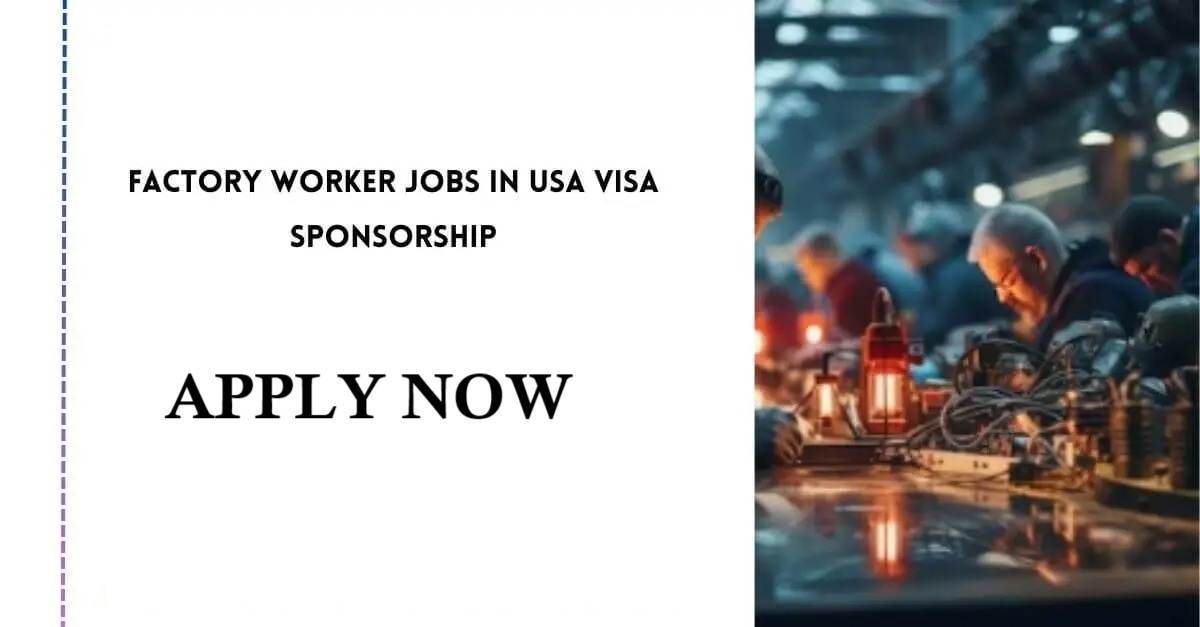Overview of the Visa Application Process
The process for obtaining a work visa for the United States is intricate and often challenging. Foreign workers interested in factory jobs must navigate various legal and administrative procedures to secure their visa and ensure their eligibility to work in the U.S.
To ensure a smooth and lawful employment experience, it is crucial to follow the outlined procedures carefully. The U.S. offers a broad range of factory positions, from basic entry-level roles in standard manufacturing settings to specialized jobs in advanced manufacturing sectors.
Types of Factory Jobs Available for Foreign Workers
Foreigners can access numerous factory jobs in the United States, depending on their skills and expertise. Here is a list of some of the most sought-after factory positions that are open to international applicants:
Available Factory Job Positions in the USA
- Production Worker/Team Member/Factory Laborer
- Warehouse Worker
- Warehouse Specialist
- General Laborer
- Production Worker
- Mattress Factory Assembly Worker
- Factory Worker/Fabricator
- Factory Worker/Machine Operator
- Production Worker – Part-Time General Sub Assembly
- Factory Worker – Mill Operator
Key Responsibilities of Factory Workers in the USA
Factory workers in the U.S. are expected to perform a variety of tasks that are essential for the smooth operation of manufacturing processes. Their responsibilities generally include:
Operating Machinery
Factory workers are responsible for operating various machines and tools used in production, including assembly lines, presses and conveyor belts. This ensures that production processes run efficiently and products are manufactured to high standards.
Product Assembly
Workers assemble parts either manually or using automated equipment to create finished products that meet quality standards. This process involves meticulous attention to detail to ensure that the end products are reliable and meet the required specifications.
Packaging and Labeling
Once products are finished, factory workers are responsible for packaging them into containers or boxes and ensuring they are correctly labeled. Proper packaging and labeling are crucial for maintaining product integrity and compliance with shipping regulations.
Loading and Unloading
Factory workers handle the loading and unloading of goods from vehicles, pallets or containers. They must ensure that these items are handled properly to prevent damage and maintain accurate inventory records.
Quality Control
Workers are tasked with inspecting products at various stages of the production process to ensure they meet quality standards. Identifying and reporting any defects or issues is essential for maintaining high production quality.
Equipment Maintenance
Regular maintenance of machines and tools is another critical responsibility. Factory workers must perform routine checks to ensure that equipment operates efficiently and safely, reporting any malfunctions or necessary repairs promptly.
Cleaning and Sanitation
Maintaining cleanliness and sanitation within the factory is crucial. Workers are expected to clean their work areas, tools and shared spaces to ensure a safe and hygienic working environment.
Following Safety Protocols
Adherence to safety protocols is essential to prevent accidents and ensure the well-being of all employees. Factory workers must follow established safety procedures and guidelines diligently.
Benefits of Working as a Factory Worker in the USA
Factory workers in the United States enjoy several benefits that contribute to their overall job satisfaction and financial well-being:
Competitive Salary
The wages for factory workers in the U.S. are competitive, enabling them to support themselves and their families comfortably. On average, factory workers earn around $20 per hour.
Career Growth Opportunities
Factory positions often come with opportunities for career advancement and skill development. Workers can progress in their careers and enhance their expertise within the manufacturing industry.
Cultural Integration
Working in a diverse environment allows factory workers to interact with colleagues from various cultural backgrounds, fostering a sense of cultural unity and understanding.
Health Insurance
Factory workers typically have access to comprehensive health insurance plans that cover medical expenses, ensuring they and their families receive necessary healthcare.
Holiday Allowance
Paid time off for vacations and holidays is a common benefit, allowing workers to relax and enjoy their time away from work.
Regular Working Hours
Most factory jobs operate on a Monday-to-Friday schedule, which helps employees maintain a balanced work-life dynamic and plan their personal activities effectively.
Pension Plans
Participation in retirement savings plans or pension schemes helps workers prepare financially for their future and secure a stable retirement.
Social Security Benefits
Factory workers can receive social security benefits, providing financial support in case of retirement or disability.
Training Programs
Access to skill development workshops and training programs helps workers improve their job-related skills and stay current with industry advancements.
Visa Sponsorship
Many employers offer visa sponsorship, simplifying the process for foreign workers seeking legal employment in the U.S.
Weekly Pay
Factory jobs often provide weekly pay, allowing workers to manage their finances efficiently and meet their financial obligations on time.
Work-Life Balance
The structured working hours and paid time off contribute to a healthy work-life balance, enhancing overall job satisfaction and well-being.
Salary Overview for Factory Workers in the USA
The average annual salary for a factory worker in the United States is approximately $33,486, translating to about $20 per hour. Entry-level positions typically start around $29,250 per year, while experienced workers can earn up to $42,653 annually.
Overall, the increase in factory worker positions available to foreign workers in the United States presents a valuable opportunity for international job seekers. By following the proper visa application procedures and understanding the benefits and responsibilities associated with factory work, foreign workers can successfully integrate into the U.S. workforce and enjoy a rewarding career in the manufacturing sector.
Frequently Asked Questions
What is the visa application process for foreign factory workers?
The visa application process involves several steps: obtaining a job offer from a U.S. employer, having the employer file a petition with U.S. Citizenship and Immigration Services (USCIS) and then applying for the visa at a U.S. embassy or consulate. It is essential to follow each step carefully and provide accurate documentation to increase the chances of visa approval.
What qualifications do I need to work as a factory worker in the U.S.?
Typically, factory worker positions require a high school diploma or equivalent, although some roles might require additional certifications or experience. Qualifications can vary depending on the specific job and employer, so it is important to review job descriptions for detailed requirements.
How much do factory workers in the U.S. earn on average?
The average salary for a factory worker in the U.S. is approximately $33,486 per year or about $20 per hour. Entry-level positions usually start around $29,250 annually, while experienced workers can earn up to $42,653 per year.
Are there benefits provided to factory workers in the U.S.?
Yes, factory workers in the U.S. typically receive several benefits, including health insurance, paid time off, retirement savings plans and access to training programs. Additionally, many jobs offer competitive salaries and opportunities for career advancement.
What are the typical working hours for factory jobs in the U.S.?
Most factory jobs in the U.S. operate on a Monday-to-Friday schedule, though some positions might require shifts or weekend work. Regular working hours contribute to a balanced work-life dynamic, making it easier for employees to plan their personal and professional lives.
How do factory workers ensure they are following safety protocols?
Factory workers must adhere to established safety protocols and guidelines to prevent accidents and maintain a safe working environment. This includes using personal protective equipment (PPE), following operational procedures and participating in safety training programs provided by the employer.
Can factory workers receive visa sponsorship for permanent residency?
While factory jobs may offer visa sponsorship for work visas, obtaining permanent residency (a green card) typically requires additional steps. Some employers may assist with green card applications, but it often depends on the individual’s visa status, job performance and employer policies.



